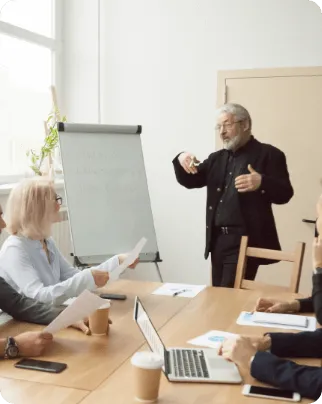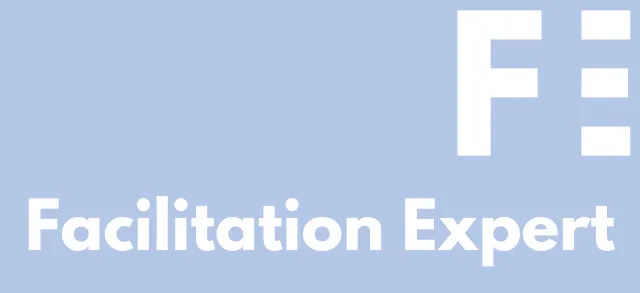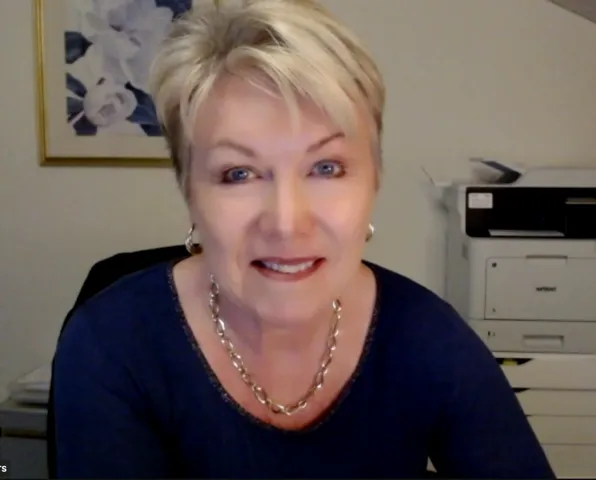Transform Your Business, Transform Your Life
Do you have what it takes to become a good facilitator?
Sign Up for the Newsletter and
receive Bonus Content
I consent to receive notifications, alerts, and occasional marketing from PLB Consulting. Message frequency varies. You may unsubscribe at any time.
Why do I need facilitation skills?
Anyone involved in the complex arena of the 21st Century workplace whether as a participant or leader of a meeting has seen or felt the need for professional skills in interactive excellence. Too many meetings go around and around where the same people hijack and dominate discussions, others rarely or never contribute, and too many end without clear decisions or strong basis for future action.
The research is clear that diverse teams that are able to optimize collective intelligence make better decisions and more frequently achieve their targets. Collaboration and working together fuse a level of intelligence and problem solving that surpasses the abilities of any single member of the group. But how to enable this collaboration?
Any professional serious about being successful in the 21St Century workplace must include Interactive excellence skills in their portfolio. Today’s problems are large, complex and often ambiguous. They require inputs from all angles and perspectives and require specific skills that enable groups to more confidently address them.
Why?
Who?
What?
Why do I need facilitator skills?
Anyone involved in the complex arena of the 21st Century workplace, whether as a participant or leader of a meeting, has seen or felt the need for professional skills in interactive excellence.
Too many meetings go around and around where the same people hijack and dominate discussions, others rarely or never contribute, and too many end without clear decisions or strong basis for future action.
The research is clear that diverse teams that are able to optimize collective intelligence make better decisions and more frequently achieve their targets. Collaboration and working together fuse a level of intelligence and problem solving that surpasses the abilities of any single member of the group.
But how to enable this collaboration? Any professional serious about being successful in the 21St Century workplace must include Interactive excellence skills in their portfolio.
Today's problems are large, complex and often ambiguous. They require inputs from all angles and perspectives and require specific skills that enable groups to more confidently address them.
Who are the facilitators?
Very few people train as facilitators as a specified career option. Most of us evolve through a circuitous career path, sometimes from a managerial pathway or a teacher/trainer and HR route. That path can be seriously advanced with professional training and coaching.
So what does it take to become a good facilitor?
According to The International Association of Facilitators (IAF), facilitators:
✔️Make a strategic and comprehensive view of the problem-solving and decision-making processes and selects the specific methods that match the group’s needs and the tasks at hand
✔️Support the group’s social and cognitive processes, freeing the group members to focus their attention on substantive issues
✔️Are trusted by all group members as a neutral party who has no bias or vested interest in the outcome
✔️Help the group understand the techniques being used and enable the group to improve its own problem-solving processes
Over the years, we have trained thousands of people in core facilitation skills to help their teams and organisations create the engaging and inclusive work environment that enables high level thinking and good forward decision making.
Why?
Why do I need facilitator skills?
Anyone involved in the complex arena of the 21st Century workplace, whether as a participant or leader of a meeting, has seen or felt the need for professional skills in interactive excellence.
Too many meetings go around and around where the same people hijack and dominate discussions, others rarely or never contribute, and too many end without clear decisions or strong basis for future action.
The research is clear that diverse teams that are able to optimize collective intelligence make better decisions and more frequently achieve their targets. Collaboration and working together fuse a level of intelligence and problem solving that surpasses the abilities of any single member of the group.
But how to enable this collaboration? Any professional serious about being successful in the 21St Century workplace must include Interactive excellence skills in their portfolio.
Today's problems are large, complex and often ambiguous. They require inputs from all angles and perspectives and require specific skills that enable groups to more confidently address them.
Who?
Who are the facilitators?
Very few people train as facilitators as a specified career option. Most of us evolve through a circuitous career path, sometimes from a managerial pathway or a teacher/trainer and HR route. That path can be seriously advanced with professional training and coaching.
What?
So what does it take to become a good facilitor?
According to The International Association of Facilitators (IAF), facilitators:
Make a strategic and comprehensive view of the problem-solving and decision-making processes and selects the specific methods that match the group’s needs and the tasks at hand
Support the group’s social and cognitive processes, freeing the group members to focus their attention on substantive issues
Are trusted by all group members as a neutral party who has no bias or vested interest in the outcome
Help the group understand the techniques being used and enable the group to improve its own problem-solving processes
Over the years, we have trained thousands of people in core facilitation skills to help their teams and organisations create the engaging and inclusive work environment that enables high level thinking and good forward decision making.
Inspire, Empower,
Succeed.

Service 1
Lorem ipsum dolor sit amet

Service 2
Lorem ipsum dolor sit amet

Service 3
Lorem ipsum dolor sit amet

Service 4
Lorem ipsum dolor sit amet
Organisations that have contracted Pamela's Services
Making a Difference Being a Facilitator

George Owens

Pamela is so skilled in transmitting her expertise that I managed to run my team meetings in a much better way. We had more fun and gave better results as a team because of it. I highly recommend to follow the course.

Kim Wexler

As a former trainer I had not fully explored the skills of a facilitator. The guidance of a facilitator during an important process of change management, for example, is vital for success. Thank you Pamela!

James Cart

My confidence has soared since being in the training with Pamela. My superiors have noted the difference and the results, and recently they have offered me a team leader position. I'm thrilled!
Unleash Your Facilitation Brilliance with...
Pamela Lupton-Bowers
After careers in academia and corporate training with Electronic Data Systems in Detroit, Michigan, Pamela Lupton-Bowers has spent the past 30 years in the humanitarian sector as a Master facilitator CPF, trainer and coach working with global International organizations and UN Agencies, such as WHO, WTO, World Scouts, Red Cross, World Economic Forum, Green Climate Fund, Concern Worldwide. She’s designed and led dozens of leadership programs, and worked with almost 1000 front line, in-field and executive teams in 60+ countries helping to improve individual and team performance and strategize organizational futures.
Unleash Your Facilitation Brilliance.
Book a call to meet with the Master Facilitator to discuss how to upgrade your skills.
© 2025 PLB Consulting Ltd - All Rights Reserved



































